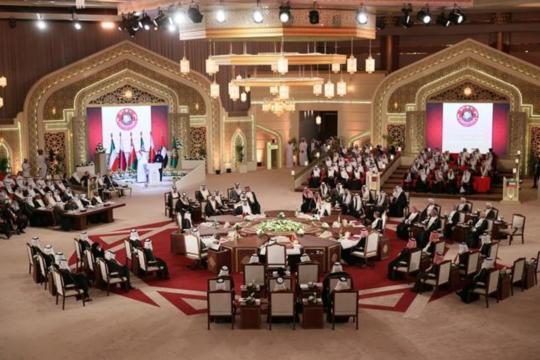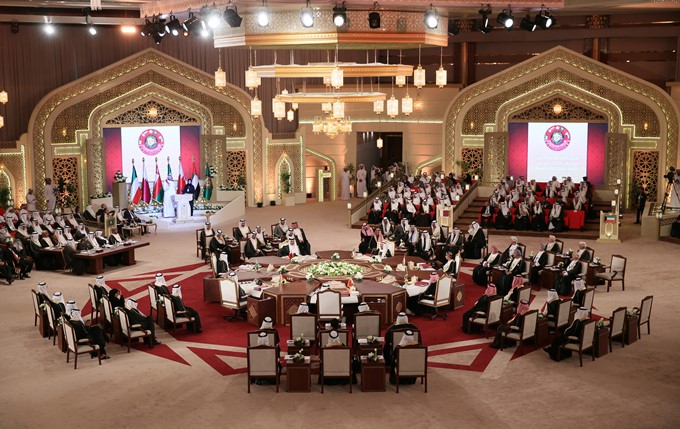
 |
| GCC leaders gather in Doha on 9 December 2014 for the 35th GCC summit [epa] |
| Abstract The 35th GCC summit took place in a context of intensifying regional insecurity. To the north of the Gulf states is the civil conflict in Syria and the rise of the nascent “Islamic State” (IS). To the south, Houthi insurgents now control much of Yemen. To the east, Iran’s nuclear programme and its desire to close the Strait of Hormuz pose serious threats. Meanwhile, to the west, the Bab el-Mandeb is at risk from maritime piracy and conflicts in the Horn of Africa. Acknowledging that insecurity in the region is deepening by the day, the GCC’s member states seem to have agreed to set aside their differences and unite behind their common interests. By recognising that conflicts in neighbouring countries have the potential to shift the balance of power in the region, the GCC is demonstrating that it is a force to be reckoned with, both in the Arab world and internationally, as well as setting an example for other countries seeking to form effective regional entities. |
Introduction
Thanks to work done during and after the previous summit, which was held in Riyadh on 16 November 2014, the atmosphere at the GCC’s December summit was relatively positive. It was at the November meeting that the eight-month diplomatic crisis over Qatar’s support for the Muslim Brotherhood began to be constructively addressed, and the stand-off between Qatar on the one hand, and Saudi Arabia, the United Arab Emirates and Bahrain on the other began to soften. With these differences overcome, the December meeting could, therefore, be hosted in Doha, and delegates focused on affirming their common interests and addressing the security concerns facing the GCC states.
Facing the challenges
Established in 1981, the basis of the GCC is to facilitate co-operation between its six member states – Bahrain, Kuwait, Oman, Qatar, Saudi Arabia and the United Arab Emirates – thus enhancing the security and wellbeing of the respective nations. Security remains the GCC’s principal challenge. According to the final communiqué from the December summit, the most important outcomes of the summit were:(1)
-
New efforts instituted to collectively address threats to the security of the member states; these efforts will be based on the principles and objectives of the GCC Charter.
-
An affirmation of the need for GCC states to work together to promote their common political, social, cultural, media, economic, and security interests.
-
An agreement to support and develop the GCC to address regional and international challenges in ways that enhance citizens’ lives in accordance with the times, as well as with regional and international realities.
Co-operation trumps conflict
The fact that Qatar hosted the summit was a clear signal that common interests had overcome the recent differences between member states. In this regard, Sheikh Tamim Bin Hamad Al Thani, the Emir of Qatar, reiterated that different views on “marginal” issues should not be allowed to undermine co-operation between member states.(2) He argued that failure to co-operate would mean that the GCC states had not yet established a solid foundation for the organisation.
A key point to note is that the GCC sees itself as a force to be reckoned with, both in the Arab world and internationally, and aims to set an example for other countries seeking to form effective regional entities. This concept, which took hold after the so-called Arab Spring began four years ago, is one that the GCC is keen to reinforce.
Leaders at the December summit reaffirmed that the security of the GCC states can best be ensured via ongoing co-operation between the states, noting the importance of resolving any differences that might arise. Accordingly, the GCC leaders acknowledged that the customs, traditions, language and faith, as well as the economic interests and common fate shared by their countries, are fundamental unifying factors, and that what unites their nations is stronger and deeper than anything that might divide them.
Addressing Arab and regional issues
At the Doha summit, the GCC leaders also discussed the various Arab and regional issues which affect their security, the most important of these being the Syrian crisis, which is now heading into its fourth year. The importance of finding a diplomatic solution in order to end the suffering of Syrians was reiterated, as was the view that Syrians have the right to defend themselves until a solution is found.
Events in Yemen, Iraq and Libya, where political and military conflicts continue to rage, were also discussed. The GCC called upon all parties to utilise reason in pursuit of the national interests of their respective nations, and to refrain from excluding any political or social components from the political process.(3)
The issue of terrorism was debated in a similar vein. In his opening speech, Sheikh Tamim noted that oppression, persecution and hopelessness inevitably lead to violence, and called on political leaders to root out the “pestilence of extremism and terrorism”, noting that prevention is better than cure.
Outcomes
In addition to the three aforementioned broad outcomes, the following resolutions were adopted at the December summit:(4)
-
The GCC leaders called for continued consultations towards the establishment of a Gulf union, as suggested by Saudi Arabia. The final communiqué emphasised the importance of increased integration among member states at all levels.
-
The delegates endorsed a unified naval force and expressed their approval of the steps already taken towards establishing a joint military leadership structure similar to NATO’s.
-
The member states reiterated their firm stances against all forms of terrorism and extremism, no matter what their source or motivation, with the leaders expressing their commitment to eradicating the sources of terrorists’ funding.
-
The GCC welcomed UN Security Council Resolution 2170 of 2014 which denounced the gross, widespread human rights abuses by extremist groups in Iraq and Syria, and placed sanctions on individuals linked to these groups.
-
Iran’s continued occupation of the three Emirati islands of Greater Tunb, Lesser Tunb and Abu Musa, was again condemned as per former communiqués. The final communiqué called upon Iran to respond to the UAE’s efforts to resolve border issues either through direct negotiations or through the International Court of Justice. The GCC thus reaffirmed the importance of cooperation between the GCC states and Iran based on the principles of good neighbourliness and refraining from interference in the internal affairs of other countries. Oman’s efforts in helping to pave the way for the agreement between the P5+1 countries and Iran over the latter’s nuclear programme were also acknowledged. Calling for a region free of weapons of mass destruction, the GCC leaders expressed the hope that the negotiations would eventually guarantee the peacefulness of Iran’s nuclear programme and take the environmental concerns of the GCC states into account.
-
The final communiqué reiterated that a comprehensive, just and lasting peace in the Middle East will be possible only with a full Israeli withdrawal from lands occupied in 1967 and the establishment of an independent, sovereign Palestinian state with East Jerusalem as its capital. The GCC denounced the repeated and savage attacks by Israeli occupation forces and extremists against unarmed Palestinians, holy sites and places of worship.
-
The summit denounced the violence perpetrated by Houthis in Yemen and their takeover of Yemen’s state, civilian and military institutions. It was noted that these actions breach Yemeni national will, as outlined in the national dialogue process, and are thwarting the country’s transitional process. The GCC members called for the immediate withdrawal of Houthi militias from all territories.
-
On the issue of Iraq, the GCC welcomed recent moves by the Iraqi government, and called for concerted efforts to reinforce national unity and to ensure Iraq’s security, stability, sovereignty and solidarity. Support for the UN Security Council’s decision to turn the issue of prisoners, the missing, and the return of Kuwaiti assets over to the UN delegation was restated.
-
Militias’ control of Libyan territories was condemned, and the importance of Libya’s security, stability and unity was reiterated, with the GCC calling on all Libyan parties to support the legitimacy of an elected parliament.
-
In support of stability and prosperity, the GCC expressed its complete support for Egypt, its government and its people, as well as for the agenda of Egyptian president Abdel Fattah el-Sisi.
Conclusion
As shown above, the leaders attending the GCC’s 35th summit opted for pragmatism – a political philosophy that often governs international relations. Setting aside their differences, they focused on the looming regional security threats. In doing so, they acknowledged that differences over certain issues do not necessarily need to affect their overall policies, affirming that the six states perceive that the factors uniting them are far more fundamental and important than their differences.
It can even be argued that the differences which arose between the GCC’s member states previously were a positive, given that they gave all parties the space to step back and reflect, and then to gather their energies and renew their commitment to their long-established goal of ever stronger cooperation.
_________________________________________
Dr. Jamal Abdullah is a researcher at AlJazeera Centre for Studies specialising in Gulf affairs.
References
1. Mohammed al-Makki Ahmed, “Gulf Summit Opens an Era of Confronting Challenges”,
Alhayat, 10 December 2014, http://alhayat.com/Articles/6166580/القمة-الخليجية-تؤسس-مرحلة-مواجهة-التحديات
2. Al-Quds al-Arabi, “Doha Summit Faces Hard Challenges By Enhancing Military Cooperation
and Political Understanding”, Al-Quds Al-Arabi, 9 December 2014,
http://www.alquds.co.uk/?p=262761.
3. Al-Arab, “Emir: Gulf Summit results deepen our unity for our people’s interests”,
Al-Arab, 10 December 2014, http://www.alarab.qa/content/pdf/12201410300.pdf.
4. Mohammed al-Makki Ahmed, Alhayyat, 10 December 2014.